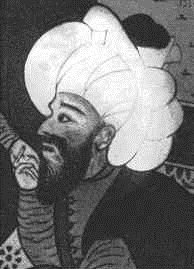
Back القوشجي Arabic Əli Quşçu Azerbaijani علی قوشچو AZB Ali Qushjí Catalan عەلی قوشچی CKB ʿAlī al-Qūschdschī German Ali Qushji Spanish علی بن محمد سمرقندی Persian Ali Quchtchi French 'Ali al-Qushji Italian
Ala al-Dīn Ali ibn Muhammed | |
|---|---|
 | |
| Personal | |
| Born | 1403 CE |
| Died | 1474 CE |
| Religion | Islam |
| Era | Ottoman era |
| Denomination | Sunni |
| Jurisprudence | Hanafi |
| Creed | Maturidi |
| Main interest(s) | Kalam (Islamic theology), Fiqh (Islamic jurisprudence), Falkiat, Mathematics |
| Notable work(s) | Concerning the Supposed Dependence of Astronomy upon Philosophy |
| Muslim leader | |
Influenced by | |
Influenced | |
Ala al-Dīn Ali ibn Muhammed (1403 – 18 December 1474[1]), known as Ali Qushji (Ottoman Turkish : علی قوشچی, kuşçu – falconer in Turkish; Latin: Ali Kushgii) was a Timurid theologian, jurist, astronomer, mathematician and physicist, who settled in the Ottoman Empire some time before 1472.[2] As a disciple of Ulugh Beg, he is best known for the development of astronomical physics independent from natural philosophy, and for providing empirical evidence for the Earth's rotation in his treatise, Concerning the Supposed Dependence of Astronomy upon Philosophy. In addition to his contributions to Ulugh Beg's famous work Zij-i-Sultani and to the founding of Sahn-ı Seman Medrese, one of the first centers for the study of various traditional Islamic sciences in the Ottoman Empire, Ali Kuşçu was also the author of several scientific works and textbooks on astronomy.[3]

- ^ Saliba, George (2012). "Chapter 9: Al-Qushjī's Reform of the Ptolemaic Model for Mercury". In Iqbal, Muzaffar (ed.). Studies in the Making of Islamic Science: Knowledge in Motion. Islam and Science: Historic and Contemporary Perspectives. Vol. 4. Routledge. pp. 177–219. ISBN 9780754629160.
- ^ Imber, Colin (1997), Ebu's-suůd: the Islamic legal tradition, Edinburgh University Press, p. 9, ISBN 978-0-7486-0767-9
- ^ Ágoston, Gábor; Masters, Bruce Alan (2009), Encyclopedia of the Ottoman Empire, Infobase Publishing, p. 35, ISBN 978-0-8160-6259-1
© MMXXIII Rich X Search. We shall prevail. All rights reserved. Rich X Search